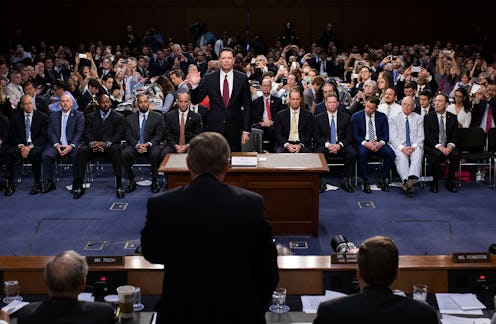News
Comey's Testimony Sparks Comparisons To Sexual Assault Victim-Blaming

James Comey’s highly-anticipated testimony Thursday was guaranteed to spark a national debate, but few could have predicted it would draw parallels to the experience of sexual assault survivors. During the Senate hearing, social media users began to compare the line of questions the former FBI director received to the hostile way some sexual assault survivors are questioned when they come forward.
As Comey fielded questions from the 15-member Senate Intelligence Committee, some claimed it sounded eerily similar to the line of questioning sometimes directed toward survivors of sexual assault. A number of different exchanges between Comey and the senators, they noted, were not unlike the heavy scrutiny and blame that survivors face for the harassment or assault they experience.
"You're big, you're strong," Democratic Sen. Dianne Feinstein said to Comey about his claim that President Trump pressured him to drop the investigation into Michael Flynn. (Trump denies he ever suggested this.) "I know the Oval Office, and I know what happens to people when they walk in. There is a certain amount of intimidation. But why didn't you stop and say, 'Mr. President, this is wrong — I cannot discuss that with you'?"
"Maybe if I were stronger, I would have," Comey said in response. "I was so stunned by the conversation that I just took it in."
Later on, Sen. Marco Rubio pressed Comey about why he didn't confront the president while the alleged exchange was happening. "At the time, did you say anything to the president about [how] that is not an appropriate request," Rubio asked. "Or did you tell the White House counsel, 'that is not an appropriate request, someone needs to go tell the president that he can't do these things'?"
"I didn't, no," Comey replied.
"Why?" Rubio asked.
"I don't know," Comey said. "I think the circumstances were such that it was — I was a bit stunned, and didn't have the presence of mind... I don't know whether, even if I had the presence of mind, I would have said to the president, 'Sir, that's wrong.'"
Another exchange that spurred parallels with the hostility and suspicion sometimes cast on sexual assault survivors involved Sen. Roy Blunt's remarks. The Republican senator questioned why, if Comey was uncomfortable being alone with Trump, he continued to interact with President Trump.
"You said to the attorney general, 'I don't want to be in the room with him alone again.' But you continue to talk to him on the phone," Blunt said. "What is the difference being in the room alone with him and talking to him on the phone alone?"
Sen. Angus King, too, questioned to what extent Comey had initiated his private one-on-one interactions with Trump. "The president said, 'I had dinner with him. He wanted to have dinner because he wanted to stay on,'" Sen. King said regarding the private dinner Comey and Trump had. "Is this an accurate statement?"
"No, sir," Comey replied.
"Did you in any way initiate that dinner?" King pressed.
In yet another exchange, this time with Sen. Martin Heinrich, Comey was asked why people should believe him over President Trump. "A lot of this comes down to who should we believe," Sen. Heinrich said. "Do you want to say anything as to why we should believe you?" His question bore chilling similarities to what survivors face when coming out about their assault or harassment. Oftentimes, their cases boil down to a "they said-you said" situation and they are forced to defend their credibility and character.
While Comey's public testimony has certainly fueled intense debate over the allegations of obstruction of justice levied against Trump, it also sparked a more unexpected conversation as social media users drew comparisons between the questions Comey faced and the treatment of survivors of sexual assault and harassment.